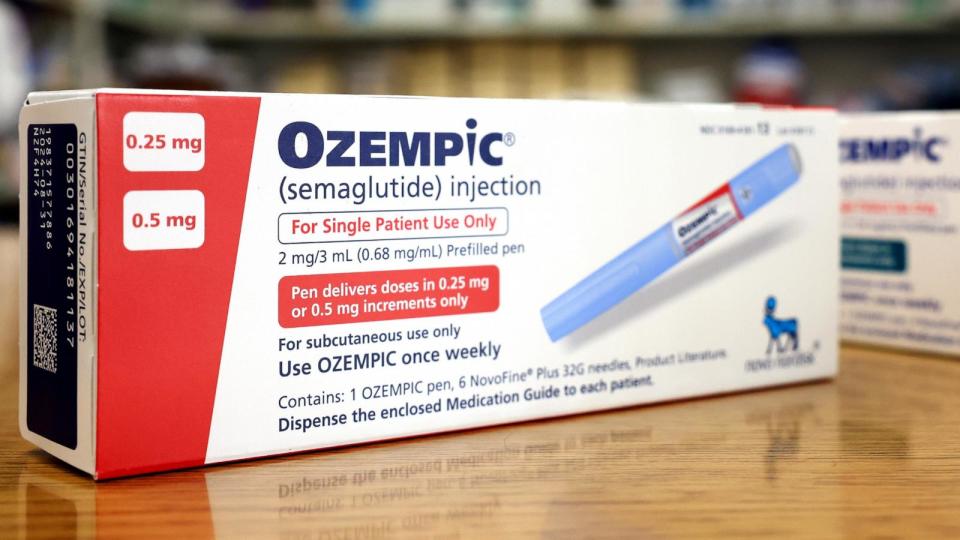What to know about new study showing weight loss drugs can lower cancer risk
GLP-1 medications such as Ozempic and Wegovy have exploded in popularity for their weight loss benefits and now new research is showing the medications may help with another condition, cancer.
People with Type 2 diabetes who were treated with GLP-1 medications were found to be less likely to be diagnosed with obesity-associated cancers than people treated with insulin or metformin, according to a new study published July 5 in the medical journal JAMA Network open.
Here are four questions answered about what the study's findings mean for the future of obesity, cancer and GLP-1 medications.
1. What types of cancer did the GLP-1 medications affect in the study?
The study, which analyzed over one decade of data from more than 1.5 million patients with Type 2 diabetes, looked at 13 types of cancer associated with obesity, including esophageal, breast, colorectal, endometrial, gallbladder, stomach, kidney, ovarian, pancreatic, and thyroid cancer as well as hepatocellular carcinoma, meningioma, and multiple myeloma.
The study found that for patients treated with GLP-1 drugs, the risk of gallbladder cancer, meningioma, pancreatic cancer, and hepatocellular carcinoma, a type of liver cancer, was cut approximately in half.
Oprah Winfrey confirms she's on a weight-loss medication, says she's tired of 'shaming'
The risk for ovarian, colorectal cancer, multiple myeloma, esophageal, endometrial and kidney cancers was also significantly reduced for patients taking GLP-1s.
In addition, the study found that people taking GLP-1 drugs did not have a higher risk for being diagnosed with cancer.
2. What are GLP-1 medications and how do they work?
GLP-1 drugs help people produce insulin to lower the amount of sugar in their blood.
The class of drugs, which include Ozempic and Wegovy, work by mimicking the effects of GLP-1, a type of hormone in the body that impacts everything from the brain to muscle to the pancreas, stomach and liver.
The drugs, made from a compound called semaglutide, work by slowing down movement of food through the stomach and curbing appetite, thereby causing weight loss. They are typically taken via a once-weekly injection.

Ozempic is approved by the U.S. Food and Drug Administration to treat Type 2 diabetes, but some doctors prescribe the medication "off-label" for weight loss, as is permissible by the FDA.
Wegovy, a medication that contains the same main ingredient, semaglutide, as Ozempic, is FDA-approved for weight loss.
Clinical studies show users of the medications can lose between 5% and 20% of their body weight over time.
3. Why are the drugs being found to help reduce the risk of cancer?
The study authors wrote that more research is needed to determine exactly how and why GLP-1 drugs may contribute to a lower risk of obesity-associated cancers.
ABC News' medical correspondent Dr. Darien Sutton, a board-certified emergency medicine physician, noted the study does not show precisely whether the GLP-1 drugs reduce the risk of cancer, or whether the weight loss they cause may lead to the lower risk.
"We're looking at a study that shows an association, not necessarily a cause and effect, and you have to take a step back and understand what is that connection," Sutton said. "The main theories include things like hormone disruption and obesity, [and] factors like growth factor and insulin increase the risk of cancer, also, immune system dysregulation."
He continued, "The question is, how did these medications fit into that puzzle and reduce these risks?"
4. For what other conditions have GLP-1 drugs been studied?
Experts have theorized that the way in which semaglutide interacts with the brain to stop overeating also helps with other addictive behaviors, including alcohol use.
One small case study published last year found that six people who screened positive for alcohol use disorder saw a clinically significant decrease in symptoms while using semaglutide, the active ingredient in Ozempic and another medication, Wegovy, for weight loss.
As use of drugs for weight loss spikes among teens, data shows girls are using them most
While this small case study doesn’t provide strong scientific evidence that these drugs can also be used to treat alcohol use disorder, experts say it does reinforce the need for larger, randomized clinical trials that are in early stages.
Other research has shown that GLP-1 drugs can help reduce the risk of kidney disease and can help reduce the risk of anxiety, according to Sutton.
Sutton said that along with the benefits of GLP-1 drugs, people have to consider the risks as well.
Among all medications used for weight loss, the most commonly reported side effects are nausea and constipation, but gallbladder and pancreatic disease are also reported. Makers of these drugs recommend having a conversation about the side effect profile and personalized risks with a healthcare professional before starting.
"It just reminds us that when we're trying to make a decision whether or not to use these, you have to have a formal understanding of what these risks are," Sutton said. "Because just like weight loss, it can be different from person to person."
What to know about new study showing weight loss drugs can lower cancer risk originally appeared on goodmorningamerica.com

